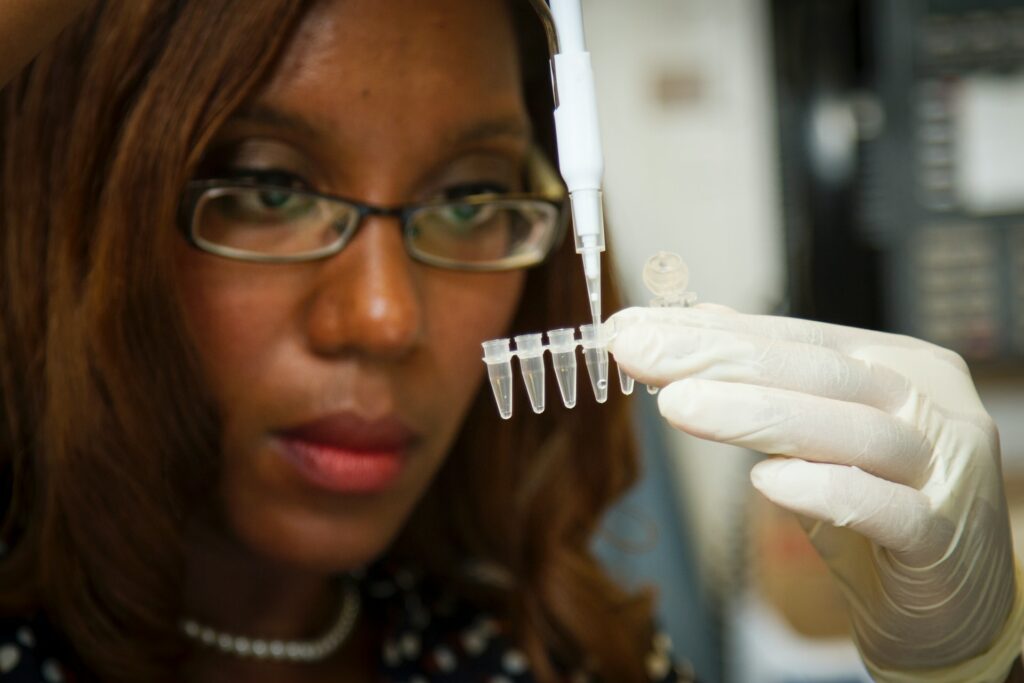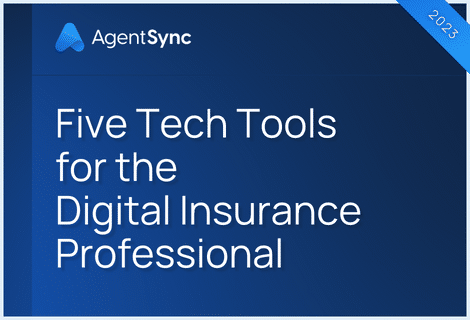

It sounds a little sci-fi: Swab your mouth, drop it in a test tube, get a readout of ancestral causes of death and statistical analyses of the markers for health you should keep your eyes on.
This future isn’t as distant as you might imagine: 23andMe’s October 2021 acquisition of Lemonaid Health was aimed at expanding the genetic service’s reach into healthcare. The opportunities that come with new technological applications also often come with some risks, new ethical dilemmas, and considerations for the insurance industry. Genetic testing is no exception.
At AgentSync, we’re big on ethics – building a business on helping people stay compliant does that to you. While we’re taking a peek at high-level considerations, make sure if you work with anything adjacent to genetic testing that you’re following real legal best practices and not just our (admittedly super cool) blog.
Current approaches to genetic testing and health
Genetic testing has become fairly routine in a few areas of health care – anyone who has had the unfortunate experience of undergoing breast cancer treatment, or those who have tested for colon cancer markers following the diagnosis of a family member may be familiar with these tests.
Yet, the Center for Disease Control on its website expresses a cautionary approach to many genomic tests:
“…genetic tests for many diseases are developed on the basis of limited scientific information and may not yet provide valid or useful results to individuals who are tested. However, many genetic tests are being marketed prematurely to the public through the Internet, TV, and other media. This may lead to the misuse of these tests and the potential for physical or psychological harms to the public.”
It’s this reticence to embrace genetic testing that 23andMe said led to the acquisition of Lemonaid Health. In the company’s announcement blog, owner Anne E. Wojcicki said consumers reported having life-changing health information revealed in their genetic tests, and then being met with “skepticism” by their physicians.
“We are acquiring Lemonaid Health so that we can bring true personalized healthcare to 23andMe customers,” Wojcicki wrote. “Personalized healthcare means healthcare that is based on the combination of your genes, your environment, and your lifestyle — with recommendations and plans that are specific to you.”
These tensions – the future opportunities and current limitations – certainly compete in medicine, and they are no less competitive and tense in insurance.
Health insurance considerations for gene testing
Predisposed to a chronic illnesses? Early markers for potential cancer? Knowing you have a heightened potential for certain illnesses can give you tools in the form of preventative care and in terms of planning for “if” becoming “when.”
Knowing you may be predisposed to stomach cancer could make you more conscious of your diet and screening practices. Certain conditions may make you inclined to have end-of-life conversations and adequate planning like advanced health care directives in place earlier than otherwise. As far as health care goes, you might also be inclined to consider certain wrap-around coverage options, or vet policies for chronic care or cancer coverage.

That’s the premise of a partnership like that of 23andMe and Lemonaid Health. Having this information can empower you to be better-prepared for the health conditions you may face. As a result, health insurance that uses genetic information to help consumers live healthier lives may save in the long run by embracing targeted preventative care.
Further, if it’s ordered by a doctor, some kinds of genetic tests are covered by health insurance. No word yet on whether the recent acquisition of Lemonaid Health means 23andMe will be covered by default.
For those in the health care industry before the Affordable Care Act (ACA), the premise of genetic testing might raise a few thoughts about exclusions from care. After all, if you’re underwriting health insurance, wouldn’t knowing about someone’s predisposition for certain illnesses be a point of concern, possibly crossing into that pre-existing condition gap that the ACA targeted in health care policies?
The ethics of this can get dicey. People need health care, period. And even a genetic predisposal is not the same thing as a certainty or inevitability. Having markers for some diseases can be overcome with lifestyle changes. Others are just guesswork altogether, with plenty of limitations inherent in emerging technologies. Making a judgment about insurance qualifications and pricing based on diseases someone may or may not ever have carries a lot of weight!
GINA and federal regulation
When it comes to health insurance, earlier federal legislation firmly puts your genetic profile in the column of “pros” not “cons.” Congress passed the Genetic Information Nondiscrimination Act (GINA) in 2008 to keep health insurers from using a person’s genetic tests as a factor in coverage. (Unrelated to the scope of this article, but still interesting: Part II of GINA prohibits genetic testing from being used as the basis of your employment, as well.)
While GINA doesn’t apply to employers with fewer than 15 employees, the majority of U.S. residents are protected from health insurance requirements for genetic tests.
That’s not to say that there aren’t any concerns as far as health care considerations and genetic testing goes. For one thing, there are still many underlying privacy concerns regarding such a deeply personal and revealing set of data as is gathered in genetic testing. Like, molecular-level privacy. For another, is it worth the anxiety of learning at age 27 that you might have a marker for colon cancer that, if it happens – IF – won’t likely be until you’re 70-plus?
Other insurance issues with genetic testing
While health insurance is often the first thing that comes to mind with something like a person’s intimate health history, GINA makes it a mostly non-issue. However, the real trouble of genetic testing and insurance comes down to other coverages: life, disability, and long-term care.
Life, disability, and long-term care insurance all price and qualify coverage based on personal factors, such as family history, lifestyle, and other personal data. And, while ordering genetic tests isn’t currently standard procedure for insurance carriers, some carriers request that applicants include test results if they have them.
This does open up a can of worms. When your cousin got you a test at Christmas last year to see if you both have Neanderthal genes, or when you and your mom tested to find the destination for that big heritage trip, did you intend to also exclude yourself from long-term care coverage down the line?
Or, should your qualification for a disability policy be determined by a statistical representation for a chronic illness that may never actually present itself?
Future applications of gene testing
Today genetic tests are still more novelty than anything. But, with more people testing and building family trees, data collections, and unearthing old family drama (Truly, who needs Maury Povitch when a simple search for “not my parents, DNA test” yields So. Much. Fruit.), the future of the science is undetermined.
Other areas of scientific inquiry could also add a layer of complexity, as well. Innovations in “biohacking” present dangers, but also raise questions about “fixing” genetics. Is genetic engineering a necessary evolution of humankind? Might it alter what it means to be human? If someone could alter their genetics to avoid a disease, could an insurer require that they do?
As the lines blur and the insurance industry traverses the landscape of emerging-but-imprecise genetic data collection, frankly, the horizon contains only more questions.
For today, insurers who have their eye on genetics are best served by keeping up with state regulations – heads up, California is ever-ready on the regs, and already has some rules on the books about biohacking.
Speaking of keeping up with insurance regulations, that’s part of what we do at AgentSync. Check out how we can help you (even before you go full cyborg).

